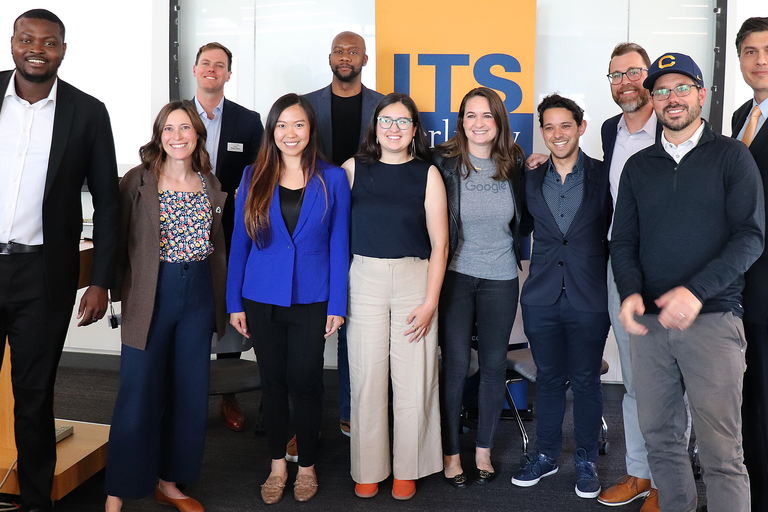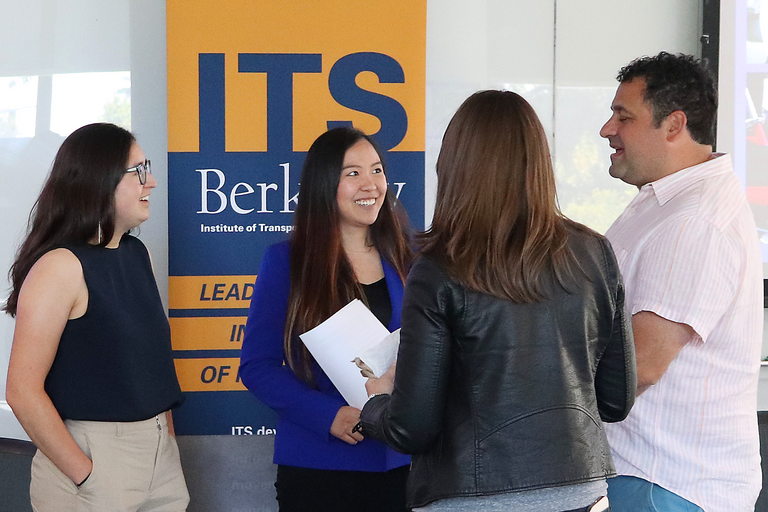The Haas Mobility Club and the University of California, Berkeley’s Institute of Transportation Studies (ITS) and Partners for Advanced Transportation Technology (PATH) presented a Haas Fireside Chat - Powering the Future: Public-Private Partnerships at the Intersection of Mobility, Autonomy, and AI on May 8, 2025 to a packed room of Haas Business and ITS students, faculty, researchers, and industry guests.
As cities, states, and companies race to redefine the future of transportation, the most impactful innovation is happening where the public and private sectors meet. This fireside discussion brings together leaders from government, industry, and academia to explore how cross-sector collaboration is shaping the next generation of mobility - from autonomous vehicle deployment and intelligent infrastructure to AI-driven decision-making and workforce development.
With two panels, the Fireside Chat explored how public-private partnerships are shaping the future of transportation through AI, automation, innovative funding models, and policy, moderated by Civil and Environmental Engineering PhD Candidate Linda Lim.
Panel 1: Public-Private Partnerships, Automation, and AI
Covering Technology & Vision, Integration & Infrastructure, Ethics & Equity, and Deployment & Research, Audience Q&A
Moderator:
- Linda Lim: PhD Candidate, Systems Engineering, UC Berkeley
Panelists:
-
Alex Bayen: Alexandre Bayen is the Director of CITRIS and the Banatao Institute and Associate Provost for the Berkeley Space Center at UC Berkeley. He holds the Liao-Cho Innovation Endowed Chair and is a professor in both Electrical Engineering and Computer Sciences and Civil and Environmental Engineering. His research focuses on control theory, optimization, and machine learning applied to transportation and infrastructure systems.
-
Arielle Fleisher: Arielle Fleisher is the Policy Development and Research Manager at Waymo, she develops policies addressing urban transportation challenges like congestion, transit integration, equity, and data-sharing. Previously, at SPUR, she led initiatives to integrate Bay Area transit systems and authored influential reports on fare policy and mobility.
-
Madeline Zhu: Madeline Zhu spent nearly a decade scaling go-to-market teams at B2G companies and advising organizations in transportation and climate. Until recently, she led operations for the SMART Grants program - the nation’s largest smart city investment - supporting 90+ grantees while managing external communications and complex interagency coordination.
-
Laolu Adeola: Laolu Adeola is the Principal and Founder of Leke Services, bringing nearly 15 years of experience in mobility strategy, fleet electrification, and sustainable transportation. As a management consultant and venture investor, he advises clients on transitioning to electric fleets and achieving climate goals. His work focuses on innovative solutions for fleet management and decarbonization strategies. Leke Services
Panel 2: Public-Private Partnerships and Innovation
Covering Public-Private Models, Funding & Finance, Data, Scaling & Equity, Role of Academia & Policy, ad Audience Q&A
Moderator:
- Linda Lim: PhD Candidate, Systems Engineering, UC Berkeley
Panelists:
-
Scott Moura: Scott Moura is a Professor of Civil and Environmental Engineering at UC Berkeley, Faculty Director at PATH, and Director of the Energy, Controls, and Applications Lab (eCAL). His research focuses on modeling, control, and optimization of energy systems, with a special emphasis on batteries, electric vehicles, and smart infrastructure. He is a leading expert in energy storage technologies and their integration into transportation networks to support decarbonization and grid resilience.
-
Tim Haile: Tim Haile is the Executive Director of the Contra Costa Transportation Authority (CCTA), where he leads strategic initiatives in planning, funding, and delivering transportation projects across the county. A recognized leader in innovation and public-private partnerships, Tim has helped position CCTA as a national model for integrating advanced mobility technologies, including autonomous vehicles, smart signals, and connected infrastructure, into regional planning and implementation.
-
Kristin White: Kristin White is the Transportation Industry Executive at Google Public Sector, leading strategy and partnerships to help advance transportation innovation. Formerly Acting Administrator and Chief Counsel at the FHWA, she oversaw a $178B budget and led 40+ programs under the Bipartisan Infrastructure Law. Her work spans federal leadership, state innovation as Executive Director of Minnesota’s CAV Office, and nonprofit leadership as COO of ITS America - championing safety, equity, and forward-looking transportation solutions.
Key Takeaways:
-
Collaboration with cities / public agencies is essential. Successful transportation companies deeply engage with cities to understand infrastructure constraints, policy goals, and community needs. Companies should partner with cities in deployment, pilots, and long-term growth.
-
Regulation and innovation must move together. Innovation in AI and automation must be balanced with public safety and equity. Strong partnerships with public agencies help shape proactive policies that enable safe testing and scaled deployment.
-
Access to public infrastructure is a strategic advantage. Companies that partner early to gain access to critical infrastructure (curb space, traffic signals, transit data, testbeds, etc) are better positioned to build defensible business models.
-
Funding models are evolving. New models - blending public grants, private capital, and performance-based contracts - are opening doors for deployment of emerging technologies without relying solely on subsidies.
-
Workforce development needs to be built in. The future of transportation requires a trained, local workforce. The most impactful partnerships include workforce training, community engagement, and pathways to good jobs.
-
Trust and transparency build long-term value. Public-private partnerships thrive when companies share data, communicate openly, and align with public outcomes like safety, access, and environmental impact.
-
Innovation hubs and research institutions are key enablers. Universities and research centers, and innovation testbeds like Gomentum and RFS, play a pivotal role by convening stakeholders, testing emerging technologies, and validating real-world performance.




























